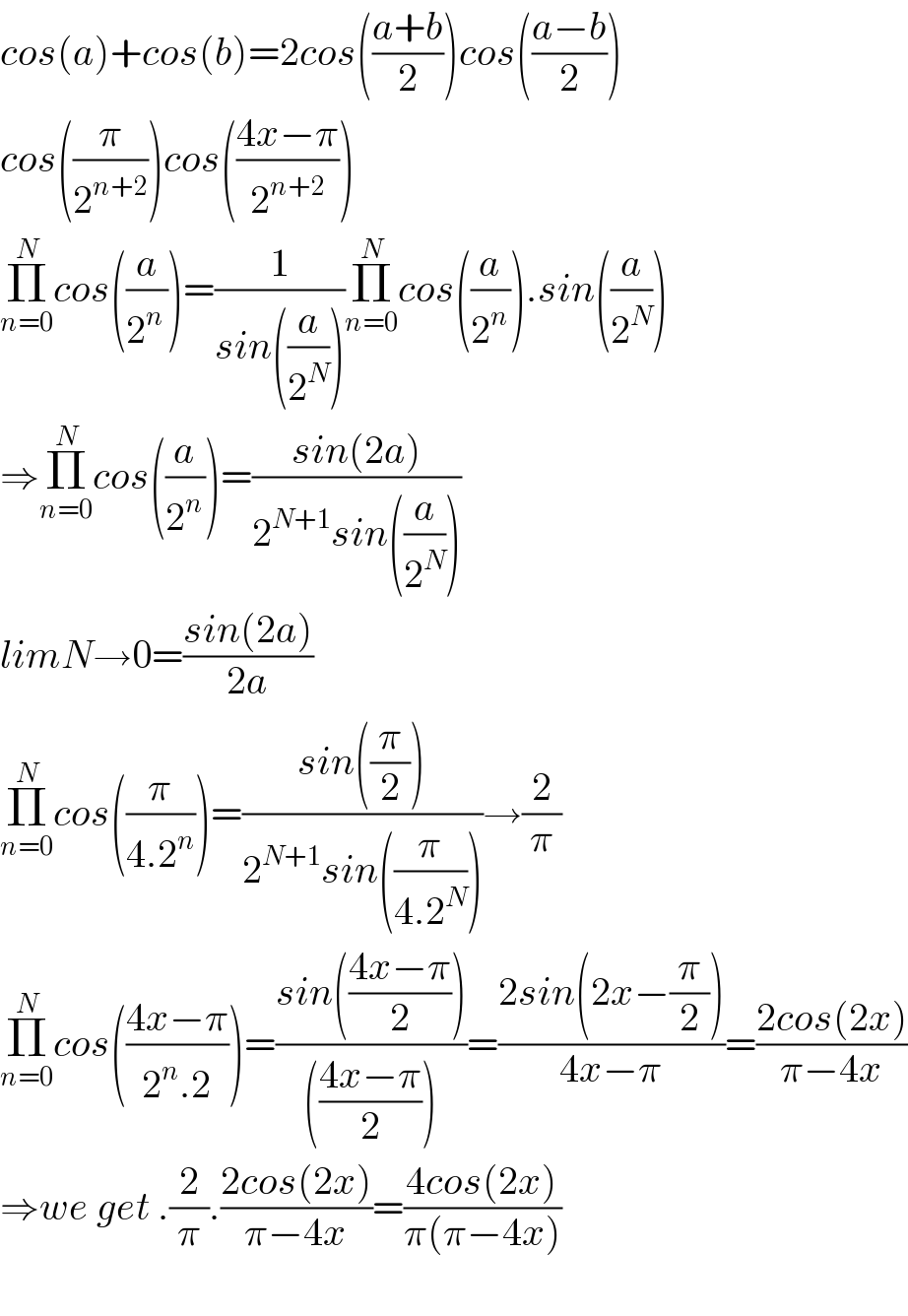
Question Number 83209 by ~blr237~ last updated on 28/Feb/20

$$\:\:\:{Prove}\:{that}\:\:\forall\:\:{x}\neq\frac{\pi}{\mathrm{4}}\:\:\:,\:\:\underset{{n}=\mathrm{0}} {\overset{\infty} {\prod}}\left(\frac{{cos}\left(\frac{{x}}{\mathrm{2}^{{n}} }\right)+{cos}\left(\frac{\pi−\mathrm{2}{x}}{\mathrm{2}^{{n}+\mathrm{1}} }\right)}{\mathrm{2}}\:\right)\:=\:\frac{\mathrm{4}{cos}\mathrm{2}{x}}{\pi\left(\pi−\mathrm{4}{x}\right)}\: \\ $$
Answered by mind is power last updated on 28/Feb/20

$${cos}\left({a}\right)+{cos}\left({b}\right)=\mathrm{2}{cos}\left(\frac{{a}+{b}}{\mathrm{2}}\right){cos}\left(\frac{{a}−{b}}{\mathrm{2}}\right) \\ $$$${cos}\left(\frac{\pi}{\mathrm{2}^{{n}+\mathrm{2}} }\right){cos}\left(\frac{\mathrm{4}{x}−\pi}{\mathrm{2}^{{n}+\mathrm{2}} }\right) \\ $$$$\underset{{n}=\mathrm{0}} {\overset{{N}} {\prod}}{cos}\left(\frac{{a}}{\mathrm{2}^{{n}\:} }\right)=\frac{\mathrm{1}}{{sin}\left(\frac{{a}}{\mathrm{2}^{{N}} }\right)}\underset{{n}=\mathrm{0}} {\overset{{N}} {\prod}}{cos}\left(\frac{{a}}{\mathrm{2}^{{n}} }\right).{sin}\left(\frac{{a}}{\mathrm{2}^{{N}} }\right) \\ $$$$\Rightarrow\underset{{n}=\mathrm{0}} {\overset{{N}} {\prod}}{cos}\left(\frac{{a}}{\mathrm{2}^{{n}} }\right)=\frac{{sin}\left(\mathrm{2}{a}\right)}{\mathrm{2}^{{N}+\mathrm{1}} {sin}\left(\frac{{a}}{\mathrm{2}^{{N}} }\right)} \\ $$$${limN}\rightarrow\mathrm{0}=\frac{{sin}\left(\mathrm{2}{a}\right)}{\mathrm{2}{a}} \\ $$$$\underset{{n}=\mathrm{0}} {\overset{{N}} {\prod}}{cos}\left(\frac{\pi}{\mathrm{4}.\mathrm{2}^{{n}} }\right)=\frac{{sin}\left(\frac{\pi}{\mathrm{2}}\right)}{\mathrm{2}^{{N}+\mathrm{1}} {sin}\left(\frac{\pi}{\mathrm{4}.\mathrm{2}^{{N}} }\right)}\rightarrow\frac{\mathrm{2}}{\pi} \\ $$$$\underset{{n}=\mathrm{0}} {\overset{{N}} {\prod}}{cos}\left(\frac{\mathrm{4}{x}−\pi}{\mathrm{2}^{{n}} .\mathrm{2}}\right)=\frac{{sin}\left(\frac{\mathrm{4}{x}−\pi}{\mathrm{2}}\right)}{\left(\frac{\mathrm{4}{x}−\pi}{\mathrm{2}}\right)}=\frac{\mathrm{2}{sin}\left(\mathrm{2}{x}−\frac{\pi}{\mathrm{2}}\right)}{\mathrm{4}{x}−\pi}=\frac{\mathrm{2}{cos}\left(\mathrm{2}{x}\right)}{\pi−\mathrm{4}{x}} \\ $$$$\Rightarrow{we}\:{get}\:.\frac{\mathrm{2}}{\pi}.\frac{\mathrm{2}{cos}\left(\mathrm{2}{x}\right)}{\pi−\mathrm{4}{x}}=\frac{\mathrm{4}{cos}\left(\mathrm{2}{x}\right)}{\pi\left(\pi−\mathrm{4}{x}\right)} \\ $$$$ \\ $$
Commented by ~blr237~ last updated on 28/Feb/20

$${nice}\:{sir} \\ $$
